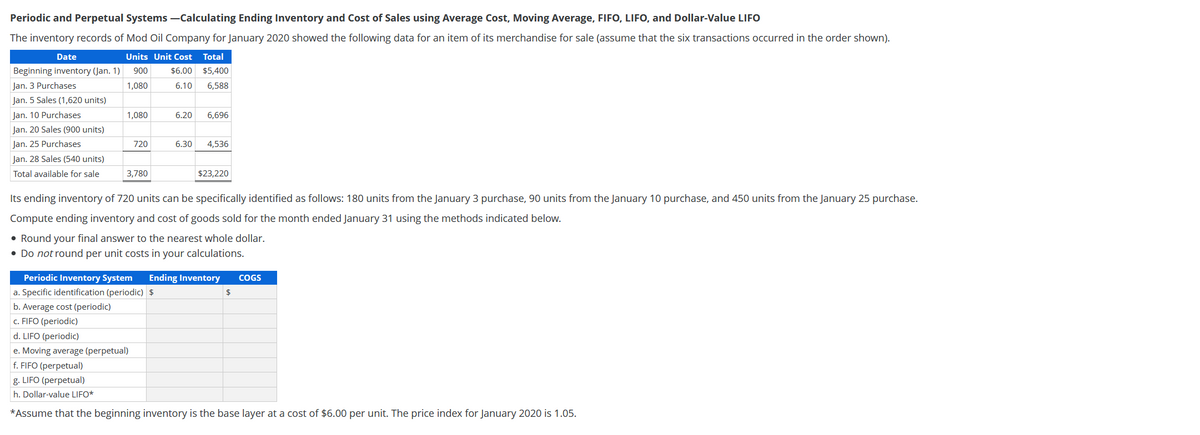Periodic and Perpetual Systems -Calculating Ending Inventory and Cost of Sales using Average Cost, Moving Average, FIFO, LIFO, and Dollar-Value LIFO The inventory records of Mod Oil Company for January 2020 showed the following data for an item of its merchandise for sale (assume that the six transactions occurred in the order shown). Date Units Unit Cost Total Beginning inventory (Jan. 1) 900 $6.00 $5,400 Jan. 3 Purchases 1,080 6.10 6,588 Jan. 5 Sales (1,620 units) Jan. 10 Purchases 1,080 6.20 6,696 Jan. 20 Sales (900 units) Jan. 25 Purchases 720 6.30 4.536 Jan. 28 Sales (540 units) Total available for sale 3,780 $23,220 Its ending inventory of 720 units can be specifically identified as follows: 180 units from the January 3 purchase, 90 units from the January 10 purchase, and 450 units from the January 25 purchase. Compute ending inventory and cost of goods sold for the month ended January 31 using the methods indicated below. • Round your final answer to the nearest whole dollar. • Do not round per unit costs in your calculations. Periodic Inventory System Ending Inventory a. Specific identification (periodic)S b. Average cost (periodic) c. FIFO (periodic) d. LIFO (periodic) e. Moving average (perpetual) f. FIFO (perpetual) g. LIFO (perpetual) COGS h. Dollar value LIFO* *Assume that the beginning inventory is the base layer at a cost of $6.00 per unit. The price index for January 2020 is 1.05.
Periodic and Perpetual Systems -Calculating Ending Inventory and Cost of Sales using Average Cost, Moving Average, FIFO, LIFO, and Dollar-Value LIFO The inventory records of Mod Oil Company for January 2020 showed the following data for an item of its merchandise for sale (assume that the six transactions occurred in the order shown). Date Units Unit Cost Total Beginning inventory (Jan. 1) 900 $6.00 $5,400 Jan. 3 Purchases 1,080 6.10 6,588 Jan. 5 Sales (1,620 units) Jan. 10 Purchases 1,080 6.20 6,696 Jan. 20 Sales (900 units) Jan. 25 Purchases 720 6.30 4.536 Jan. 28 Sales (540 units) Total available for sale 3,780 $23,220 Its ending inventory of 720 units can be specifically identified as follows: 180 units from the January 3 purchase, 90 units from the January 10 purchase, and 450 units from the January 25 purchase. Compute ending inventory and cost of goods sold for the month ended January 31 using the methods indicated below. • Round your final answer to the nearest whole dollar. • Do not round per unit costs in your calculations. Periodic Inventory System Ending Inventory a. Specific identification (periodic)S b. Average cost (periodic) c. FIFO (periodic) d. LIFO (periodic) e. Moving average (perpetual) f. FIFO (perpetual) g. LIFO (perpetual) COGS h. Dollar value LIFO* *Assume that the beginning inventory is the base layer at a cost of $6.00 per unit. The price index for January 2020 is 1.05.
Cornerstones of Financial Accounting
4th Edition
ISBN:9781337690881
Author:Jay Rich, Jeff Jones
Publisher:Jay Rich, Jeff Jones
Chapter6: Cost Of Goods Sold And Inventory
Section: Chapter Questions
Problem 50E: Inventory Costing Methods Crandall Distributors uses a perpetual inventory system and has the...
Related questions
Topic Video
Question

Transcribed Image Text:Periodic and Perpetual Systems -Calculating Ending Inventory and Cost of Sales using Average Cost, Moving Average, FIFO, LIFO, and Dollar-Value LIFO
The inventory records of Mod Oil Company for January 2020 showed the following data for an item of its merchandise for sale (assume that the six transactions occurred in the order shown).
Date
Units Unit Cost
Total
Beginning inventory (Jan. 1)
900
$6.00
$5,400
Jan. 3 Purchases
1,080
6.10
6,588
Jan. 5 Sales (1,620 units)
Jan. 10 Purchases
1,080
6.20
6,696
Jan. 20 Sales (900 units)
Jan. 25 Purchases
720
6.30
4,536
Jan. 28 Sales (540 units)
Total available for sale
3,780
$23,220
Its ending inventory of 720 units can be specifically identified as follows: 180 units from the January 3 purchase, 90 units from the January 10 purchase, and 450 units from the January 25 purchase.
Compute ending inventory and cost of goods sold for the month ended January 31 using the methods indicated below.
• Round your final answer to the nearest whole dollar.
• Do not round per unit costs in your calculations.
Periodic Inventory System
Ending Inventory
COGS
a. Specific identification (periodic) $
2$
b. Average cost (periodic)
c. FIFO (periodic)
d. LIFO (periodic)
e. Moving average (perpetual)
f. FIFO (perpetual)
g. LIFO (perpetual)
h. Dollar-value LIFO*
*Assume that the beginning inventory is the base layer at a cost of $6.00 per unit. The price index for January 2020 is 1.05.
Expert Solution
This question has been solved!
Explore an expertly crafted, step-by-step solution for a thorough understanding of key concepts.
This is a popular solution!
Trending now
This is a popular solution!
Step by step
Solved in 4 steps

Knowledge Booster
Learn more about
Need a deep-dive on the concept behind this application? Look no further. Learn more about this topic, accounting and related others by exploring similar questions and additional content below.Recommended textbooks for you

Cornerstones of Financial Accounting
Accounting
ISBN:
9781337690881
Author:
Jay Rich, Jeff Jones
Publisher:
Cengage Learning

Intermediate Accounting: Reporting And Analysis
Accounting
ISBN:
9781337788281
Author:
James M. Wahlen, Jefferson P. Jones, Donald Pagach
Publisher:
Cengage Learning

Financial And Managerial Accounting
Accounting
ISBN:
9781337902663
Author:
WARREN, Carl S.
Publisher:
Cengage Learning,

Cornerstones of Financial Accounting
Accounting
ISBN:
9781337690881
Author:
Jay Rich, Jeff Jones
Publisher:
Cengage Learning

Intermediate Accounting: Reporting And Analysis
Accounting
ISBN:
9781337788281
Author:
James M. Wahlen, Jefferson P. Jones, Donald Pagach
Publisher:
Cengage Learning

Financial And Managerial Accounting
Accounting
ISBN:
9781337902663
Author:
WARREN, Carl S.
Publisher:
Cengage Learning,

College Accounting, Chapters 1-27
Accounting
ISBN:
9781337794756
Author:
HEINTZ, James A.
Publisher:
Cengage Learning,

Financial Accounting: The Impact on Decision Make…
Accounting
ISBN:
9781305654174
Author:
Gary A. Porter, Curtis L. Norton
Publisher:
Cengage Learning

Survey of Accounting (Accounting I)
Accounting
ISBN:
9781305961883
Author:
Carl Warren
Publisher:
Cengage Learning